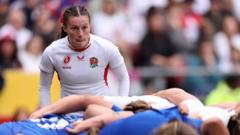Did Enzo Maresca Make a Mistake by Starting Chelsea's 'Useless' Star Against Man Utd?

Published: 2025-09-21 10:35:54 | Category: Football
In a surprising tactical decision, Chelsea manager Enzo Maresca started Cole Palmer against Manchester United despite the midfielder's ongoing struggles with a groin injury. Palmer was substituted just 21 minutes into the match, raising questions about Maresca's judgment in risking an unfit player. This decision has drawn criticism from former Chelsea defender Frank Leboeuf, who believes a fully fit squad is crucial for success.
Last updated: 03 October 2023 (BST)
Understanding the Context of Cole Palmer's Injury
Cole Palmer's recent performances have been hampered by a persistent groin injury, which has seen him miss several key matches, including fixtures against West Ham, Fulham, and international duty with England. The injury was particularly concerning during Chelsea’s 3-1 Champions League defeat to Bayern Munich, where Palmer was visibly in discomfort.
- Palmer missed multiple games due to a groin injury.
- He was substituted early against Manchester United.
- Frank Leboeuf questioned the decision to start Palmer.
- Maresca admitted Palmer wasn’t fully fit for the match.
- Chelsea's tactical adjustments followed a red card for Robert Sanchez.
Why Start an Unfit Player?
Despite knowing about Palmer's condition, Maresca opted to include him in the starting line-up against Manchester United. This decision is puzzling, especially considering the risk of exacerbating an injury that could sideline a player for months. Leboeuf voiced his concerns, stating that a player should only return from an injury when they are 100 per cent fit, regardless of their talent or past performances.
The Risks of Playing Hurt
Leboeuf, who has had his share of groin injuries during his career, highlighted the importance of proper recovery. Playing at reduced capacity can lead to poor performance and potential long-term consequences. He emphasised that even elite players, like Diego Maradona and Zinedine Zidane, should prioritise their health over immediate game participation. An unfit Palmer can negatively impact Chelsea’s overall game dynamics, as he cannot fully utilise his skills.
Substitutions and Tactical Decisions
Before Palmer's early substitution, Chelsea found themselves down to ten men after goalkeeper Robert Sanchez received a straight red card for a foul on Bryan Mbeumo. This situation forced Maresca to make immediate tactical changes, leading to the withdrawal of both Estevao and Pedro Neto in an attempt to shore up the defence.
Leboeuf's Critique of Substitution Choices
Leboeuf was particularly critical of Maresca’s decision to substitute Neto instead of Palmer. He argued that it was counterintuitive to remove a fully fit player while retaining someone who was clearly not at full capacity. The decision to replace Neto, who could have contributed to Chelsea's attack, instead of Palmer, seemed illogical to the former defender.
Maresca’s Justification
In response to criticisms regarding his tactical decisions, Maresca explained that the changes were made to adapt to United's attacking style. He felt that with a numerical disadvantage, a back five would provide better defensive coverage. However, this reasoning did not assuage the doubts surrounding his initial choice to start Palmer.
What Happens Next for Chelsea?
Moving forward, Chelsea must address their injury management and player fitness. The reliance on players who are not fully fit can hinder team performance, especially in high-stakes matches. The challenge for Maresca will be to balance squad rotation with the need for competitive performance.
The Broader Implications for Team Strategy
Injuries can significantly impact a team's strategy and performance. Chelsea’s coaching staff will need to reassess their approach to player fitness and tactical decisions. Maintaining a healthy squad is vital for achieving success in the Premier League and beyond.
Conclusion
Maresca's decision to start Cole Palmer, despite his lack of fitness, raises critical questions about player management and tactical choices under pressure. As the season progresses, Chelsea must ensure that all players are at their best to compete effectively. The fate of the team may hinge on how well they can navigate these challenges while keeping their squad healthy.
How will Chelsea adapt their strategy moving forward to prevent similar situations? Only time will tell. #ChelseaFC #PremierLeague #InjuryManagement
FAQs
Why was Cole Palmer substituted early in the game against Manchester United?
Cole Palmer was substituted early due to concerns over his groin injury, which had previously caused him to miss several matches. His lack of full fitness raised questions about his starting role.
What did Frank Leboeuf say about the decision to start Palmer?
Frank Leboeuf expressed confusion over the decision to start Palmer, emphasising that players should only return from injuries when fully fit to avoid long-term complications.
What was Chelsea's situation during the match against Manchester United?
During the match, Chelsea faced a significant disadvantage after goalkeeper Robert Sanchez received a red card, leading to tactical adjustments and substitutions to strengthen their defence.
What are the potential risks of playing an injured player?
Playing an injured player can exacerbate the injury, leading to longer recovery times and decreased performance. It can also affect the overall team dynamics and performance.
How can Chelsea improve their injury management?
Chelsea can improve injury management by closely monitoring player fitness, implementing effective recovery protocols, and ensuring players return only when fully fit to compete.



